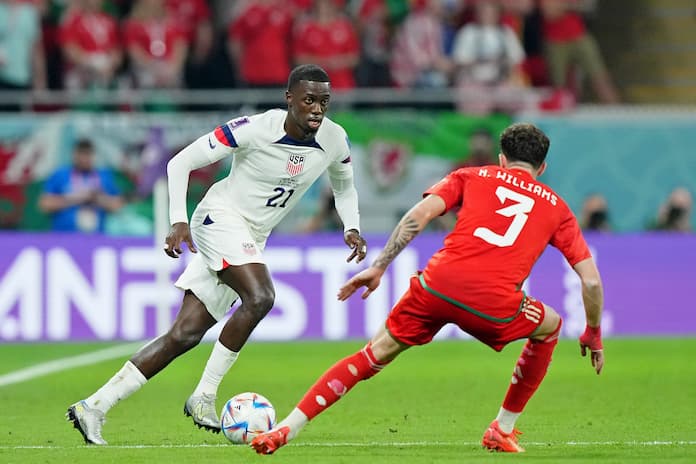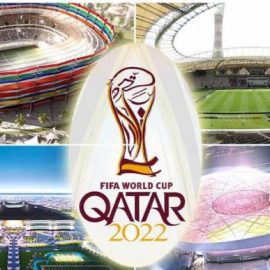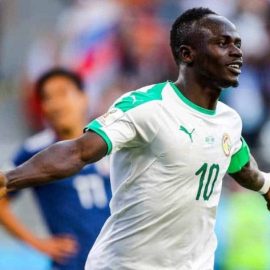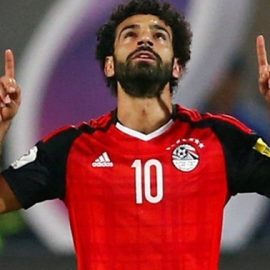The FIFA Exco will meet this week to decide the destination of the 2018 and 2022 World Cups. Here we look at each bidding nation and the 23 men whose vote will decide the winners.
The 2018 World Cup will go to Europe as Holland/Belgium, Spain/Portugal, England and Russia address the FIFA Exco with their final submissions on December 2. One day before the five bidding nations for 2022 will get their chance to state their case.
Each submission can only last a maximum of 30 minutes and is the final chance the bidding nations have to sway the vote.
So far, the Iberian bid claims to have eight votes guaranteed for 2018 while Qatar seems quietly confident for 2022.
To win the World Cup 13 votes must be won, with the process eliminating a bidding nation until that total can be reached.
Here we look at each bidding nation, their strengths and weaknesses and the 23 Exco members and where they may or may not vote.
Spain & Portugal 2018
Stadiums:
Alicante (30,000), Atletico Madrid (Provisional- 73,000), Barcelona (100,000), Espanyol (55,926), Benfica (65,647), Bilbao (Provisional- 53,000), Gijon (Provisional- 40,000), La Coruna (Provisional- 45,000), Malaga (Provisional- 45,000), Porto (50,399), Murcia (Provisional- 41,000), Real Madrid (80,354), San Sebastian (Provisional- 43,000), Sporting Lisbon (50,000), Santander (Provisional- 45,000), Valencia (Provisional- 75,000)
Strengths:
Both countries have organised major tournaments in recent years, Portugal with Euro 2004 and Spain with World Cup 1982. Infrastructure is already in place between the major cities and despite the tournament being across two countries the potential travelling for teams would be less than that in South Africa 2010 or Brazil 2014.
Weaknesses:
Spain and Portugal are part of the infamous “PIGS” with Ireland and Greece and are in real danger of being contaminated by the recessions and fiscal problems in those countries. With the need to build up to nine stadiums at a cost of billions of government money this is where FIFA’s worries will lie.
This bid is based on the finances of each country. Spain had originally stated its intent to bid alone but could not afford the much refurbishment to its stadia.
Russia 2018
Stadiums:
Kaliningrad (Provisional- 45,000), Kazan (45,000), Krasnodor (Provisional- 50,000), Moscow Dynamo (45,000), Moscow Luzhniki (89,318), Moscow Region (45,000), Moscow Spartak (46,990), Nizhny Novgorod (Provisional- 45,000), Rostov (Provisional- 44,000), Samara (Provisional- 45,000), Saransk (Provisional 45,000), Sochi (47,659), St. Petersburg (69,501), Volgograd (Provisional 45,000), Yaroslav (Provisional- 45,000)
Strengths:
Russia is very much seen as a new frontier by FIFA. The sheer size of the country and how much the World Cup could impact upon it is almost too intoxicating for Sepp Blatter to contemplate. There have been a raft of promises regarding stadia, security, and infrastructure and FIFA would like nothing more than to step back and say they had a hand in moving a country forward.
Finances will be no problem as Russia has already committed £10 billion and a promise of five stadiums ready for 2013 with more funding if necessary.
Weaknesses:
The size of Russia cannot be underestimated. Despite naming three stadiums in Moscow this particular tournament’s travelling will be huge for teams especially in the group stages. One would have to figure that Moscow will figure heavily for the home country and the semi-finals onwards.
Infrastructural promises will be hard to meet as will security promises and Russia boasts one of the most racist fan-bases in world football. There will be a huge amount of hurdles to surpass if Roman Abrahmovich and Alexi Smertin are to bring this tournament home to Vladimir Putin.
England 2018:
Stadiums:
Arsenal (60,355), Bristol City (Provisional- 45,000), Leeds United (39,460), Liverpool (Provisional- 60,000), London Olympic Stadium (Provisional 80,000), Manchester City (47,726), Manchester United (75,957), Milton Keynes (Provisional- 46,000), Newcastle (52,387), Nottingham Forest (Provisional 45,000), Sheffield Wednesday (39,812), Sunderland (49,000), Tottenham Hotspur (Provisional- 63,000), Wembley (90,000)
Strengths:
The small size of England added to the fact that it is going it alone is of a huge advantage to the David Dein led bid. Euro 1996 proved that the infrastructure in the country is up to the task and each match is guaranteed to sell out.
One of the greatest tributes to the 1966 World Cup was how each region took to whatever team was based there and supported them throughout the tournament guaranteeing great atmospheres and sell-outs for every match.
The compact travel options for travelling fans will appeal to FIFA and the nation really needs to win the bid for 2018 to further push a sport that is beginning to lose some of its lustre.
This will be a complicated proposal for Blatter who has clearly favoured “new frontiers” and may not like to go back to one of the old guard after awarding the tournament to Brazil in 2014.
Knowing that Blatter is a political animal, David Cameron, the British Prime Minister, has met with the FIFA President on numerous occasions to offer financial and political guarantees.
Weaknesses:
One of England’s greatest strengths is also its biggest weakness; the media. FIFA feel under threat by a body that is determined to uncover corruption in sporting bodies.
Holland/Belgium 2018:
Stadiums:
Amsterdam Arena (Provisional- 65,000), Amsterdam Olympisch (Provisional- 44,000), Antwerp (Provisional- 45,000), Brussels (Provisional- 80,000), Charleroi (Provisional- 45,000), Bruges (Provisional- 40,000), Enschende (Provisional- 45,000), Gent (Provisional- 40,000), Genk (Provisional- 45,000), Heerenveen (Provisional- 44,000), Liege (Provisional- 50,000), Rotterdam-De Kuip (51,577), Rotterdam Nieuwe-Kuip (Provisional- 82,500), PSV (Provisional- 45,000)
Strengths:
The massive success of Euro 2000 will not be lost on FIFA as they decide on the Dutch/Belgian bid. The small size of the two countries with an excellent public transport system means that supporters can move freely between matches. As far as a twin host is concerned this is the ideal that FIFA would like to promote in the future.
Weaknesses:
With the current fiscal problems in Europe it would take the two governments to put billions aside as every single proposed stadium is either in need of refurbishment or rebuilding bar one. This is something FIFA will be keen to focus on and will already have made tentative enquires about such matters.
The lack of an 80,000 stadium is a huge negative against this bid, with respective governments unwilling to commit. Also, FIFA like fans to be separated and this bid would only see five cities host the entire tournament.
Against Russia and England the Dutch/Belgium bid is a distant third and is also some distance behind Spain and Portugal who already have stadia in reserve.
Football wise the area is in a similar place to English football and is in need of a shot in the arm rather than representing a new frontier.
Qatar 2022:
Stadiums:
Al-Khawr (Provisional- 45,000), Al-Rayyan (Provisional 45,000), Al-Wakrah (Provisional- 45,000), Asha-Shamal (Provisional- 45,000), Doha-Al-Gharfa (Provisional- 40,000), Doha-Education-City (Provisional- 45,000), Doha-Khalifa (Provisional- 70,000), Doha-Port (Provisional- 45,000), Doha-Sports-City (Provisional- 47,500), Doha-University (Provisional- 43,500), Umm-Salal (Provisional- 45,000)
Strengths:
To say that Qatar has limitless funding is something of an understatement, the Qatari bid has possibly more funding available to it that every other bid combined. If Qatar won it would be the first time that the World Cup was played in the Middle East and they have already spent millions developing air conditioning systems to allow matches to be played under normal intense heat.
They are believed to have already struck deals with a number of European and South American nations.
Weaknesses:
The smallest bidding nation of all time, around 1 million of a population, Qatar has little or no footballing infrastructure and every single stadium would have to be built to meet the standards required. There is also the travelling distance to be factored in, an essential element that put off many from travelling to South Africa last summer.
USA 2022:
Stadiums:
Atlanta (71,228), Baltimore (71,008), Boston (73,393), Dallas-Arlington (91,600), Dallas-Cotton Bowl (92,100), Denver (75,165), Houston (76,000), Indianapolis (66,500), Kansas City (75,364), Los Angeles (93,607), Miami (80,240), Nashville (69,143), New York (82,566), Pasadena (94,542), Philadelphia (69,111), Phoenix (71,362), San Diego (67,700), Seattle-Husky (72,500), Seattle-Qwest (68,065), Tampa (73,393), Washington (91,704)
Strengths:
The only bidding nation who do not need to put any money into stadia. Good infrastructure in place and pockets of every competing nation throughout the vast country almost guarantees sell out crowds throughout.
The sheer size of the stadia should also not be underestimated especially when the average stadia size proposed by other bidders is just 45,000. The USA also provides huge marketing and television opportunites for FIFA.
Weaknesses:
Having already had the World Cup in 1994 the chances of hosting the tournament in 2022 is minimal. However, there is little doubt that the USA needs a major tournament to push the development of football, and soon. It is unlikely to be 2022 though.
The size of the country is also a major negative. Complaints at having to travel huge distances between matches and having to play in the mid-day sun to suit television throughout the world during the 1994 are still ringing in the ears of FIFA.
Australia 2022:
Stadiums:
Adelaide Oval (33,597), Blacktown (Provisional- 41,000), Carrara (Provisional- 40,000), Canberra (Provisional- 40,000), Brisbane Lang (52,500), Geelong (35,000), Melbourne (100,000), Newcastle (Provisional- 42,000), Perth (Provisional- 45,000), Queensland Willows (Provisional- 40,000), Sydney (45,500), Sydney Stadium (83,500)
Strengths:
Australia has already proved that it can handle a tournament of huge importance when it hosted the Olympics in 2000 but the World Cup has its own problems. The weather will be of a huge advantage as the Southern Hemisphere will be in the middle of its winter when the competition comes around and should provide ideal conditions.
It also represents a new frontier although its impact upon Oceania and Asia in general will be lessened because of the travelling distances.
Weaknesses:
Travelling distances and huge expense because of it will definitely go against Australia. As will the time that most matches will be played at, the largest viewing audience is in Europe where figures are likely to be hit.
One other problem that Australia faces is that it is unlikely to get any help from its own federation as South Korea and Japan will be able to count upon old allegiances.
Japan 2022:
Stadiums:
Fukazawa (50,889), Kashima (40,000), Kobe (45,000), Niigata (42.300), Oita (40,000), Osaka-Magai (50,000), Osaka-Umeda (Provisional 80,000), Saitama (63,700), Sapporo (41,484), Tokyo-Ajinomoto (49,970), Tokyo-National (50,339), Tokyo-Toyota (45,000), Yokohama (72,327)
Strengths:
Japan already has everything in place from 2002 and is leading the line to recreate the fan-zones that were so successful in Germany. Here the Japanese hope use state of the art 3D screens to further enhance the tournament for the watching public.
Weaknesses:
Having hosted 2002 and the tournament being a bit of a commercial disaster as far as television coverage was concerned it seems unlikely that Japan 2022 will have many supporters, especially as Korea and Australia are splitting a vote that they could normally count upon.
Japan was also bidding for the Olympics in 2016. This bid was strategically important for the addition of a FIFA required 80,000 seat stadium which the Japanese FA had committed to help build. However, with the bid going elsewhere the JOC has refused to aid the JFA and as such their bid has been hit badly.
South Korea 2022:
Stadiums:
Busan (Provisional- 60,000), Cheonan (Provisional- 45,000), Daegu (Provisional- 81,422), Daejon (40,535), Goyang (41,000), Gwangju (40,245), Incheon Asiad (Provisional- 70,000), Incheon-Munchak (50,000), Jeju (Provisional- 43,000), Jeonju (43,389), Seoul Jamsil (70,000), Seoul WC, (Provisional- 83,000), Suwon (43,959), Ulsan (44,000)
Strengths:
Like Japan, South Korea already has most of its infrastructure in place from 2002. Most of the stadiums are modest in size and as such are almost guaranteed to sell out as the Korean public will support in huge figures.
Weaknesses:
Hosting the competition in 2002 will go against South Korea for all the same reasons as the vote will go against Japan. Their World Cup bid has become a convoluted affair after the government decided to completely back Pyeong Chang’s bid for the Winter Olympics in 2018 and as a result the 2022 bid has received luke-warm attention. An unlikely outsider.
The FIFA Exco:
The FIFA Executive Committee is the representative body of FIFA that decides the direction the game will take in the future.
It is made up of the FIFA President, eight Vice-Presidents and 15 members who are appointed by confederations and associations.
It meets at least twice a year, with the mandate for each member lasting four years, and its role includes determining the dates, locations and format of tournaments.
Under normal circumstances the voting process would be decided by all 24 members. However, two members Adamu and Temarii have been suspended following a bribery sting by The Times in England.
As a result, many FIFA executives have spoken out against the English media and how their actions could have ruined England’s hopes of hosting the tournament in 2018.
Here we look at each member and where there votes may be cast.
FIFA President: Sepp Blatter
The FIFA President, Sepp Blatter, has been a member of the Exco. Since 1998 when he succeeded Joao Havelange.
His career with FIFA has been dogged with allegations of corruption and bribery since he became President in ‘98.
According to David Yallop who wrote the astounding How They Stole the Game, Blatter was backed by the Emir of Qatar in 1998 as votes were bought to win the Presidency.
Qatar is one of the leading nations for 2022…
2018: UNKNOWN
2022: Qatar (probable)
Senior FIFA Vice President: Julio Grondana (Argentina)
Also known as “the Godfather” Grondona has served as an Exco. Member since 1988. He took over as Argentine President after the World Cup victory in 1978 and has overseen great change in the game since then.
2018: Spain/Portugal
2022: Qatar (probable)
FIFA Vice President: Issa Hayatou (Africa)
The Cameroonian is the most senior African delegate on FIFA and has served on the Exco. since 1990. In 2002 he ran against Blatter for President but was beaten by the incumbent to the post.
Since getting into power he has waged Africa’s war against UEFA’s plundering of it’s youth and as a result he created the meridian Project in ‘97 which saw UEFA provide cash payments every two years to African federations every two years as compensation.
2018: UNKNOWN
2022: UNKNOWN
FIFA Vice President: Chung Mong-Joon (Asia)
Chung Mong-Joon is a South Korean businessman and politician and is head of FIFA in Asia. He is a known opponent of Blatter but needs his President’s support if Korea is to stand any chance of staging the competition again and has quietened of late.
He is expected to challenge Blatter to the FIFA presidency next year.
Chung also forced Australia to remove it’s bid for the 2018 World Cup. A move which will have ramifications as the voting moves onto the next round.
2018: England (probable)
2022: Korea
FIFA Vice President: Jack Warner (CONCACAF)
Jack Warner’s vote is one of the most important in the entire process as he can guarantee three votes to whoever wins his favour.
He supported England in 2006 until the bid ran out of options before switching to Germany who eventually won the process.
However, he has been quoted on Panorama as saying that England deserve little and that Spain, Italy, or France should be given the tournament before them.
Like Blatter, allegations of corruption have dogged his term in office. Most recently he brokered a bonus deal for the Trinidad and Tobago team in the 2006 World Cup. He then said that he had received TT$18 million from FIFA but this figure was questioned by the players who hired lawyers to look into the matter for them. They found that FIFA had awarded TT$173 million to Warner…
2018: England (probable)
2022: USA
FIFA Vice President: Angel Maria Villar (Europe)
The qualified lawyer and ex-international footballer has been with FIFA since 1998. A founding member of Spain’s Professional Footballer Association, Villar has occupied several posts in FIFA and UEFA.
It would be his greatest achievement to see the tournament come to Spain, especially as they are the current World Champions.
2018: Spain/Portugal
2022: Qatar
FIFA Vice President: Michel Platini (Europe)
The President of UEFA and former-international footballer with France is one of the most powerful men in the game. He is relatively new to the Exco, having only joined in 2002 but he carries a lot of weight in the game.
2018: Unknown
2022: Unknown
FIFA Vice President: Reynald Temarii (France/Tahiti)***
Reynald Temarii was one of the two FIFA delegates who were caught in a sting by The Times. As a result he received a one year suspension pending an investigation.
However, he has since admitted guilt and his position will be filled by another delegate from the region. It has yet to confirmed who will replace him though.
Reports suggest that David Chung has flown to Zurich to vote for Oceania.
2018: Spain/Portugal (probable)
2022: Australia (probable)
FIFA Vice President: Geoff Thompson (Home Nations)
Thompson has been a member of the Exco. since 2007. The district court judge succeeded Lord Triesman after theformer FA chief accused rival bidders, Spain and Russia, of bribery. The end result was Triesman resigning in disgrace.
2018: England
2022: USA (probable)
Exco Member: Michael D’Hooghe (UEFA)
The Honorary President of the Belgian FA and President of Bruges has been an Exco member since 1988. A doctor and specialist in sports medicine, D’Hooghe has been one of the most influential members of UEFA over the last 32 years.
2018: Holland/Belgium
2022: UNKNOWN
Exco Member: Ricardo Terra Teixeira (Brazil)
Brazil’s member of the Exco is Ricardo Terra Teixeira. He has been a member of the Exco since 1994 and has stated his intention to stay on at the CBF until his 25th anniversary at the federation when the World Cup concludes in 2014.
2018: Spain / Portugal
2022: Qatar (probable)
Exco Member: Mohammad Bin Hammam (Asia)
Mohammad Bin Hammam has been an Exco member since 1996 and has seen the Asian federation grow during his tenure. He has been instrumental in the AFC Champions League and the inclusion of Australia to better the in international game. However, he has also opposed Australian team’s participation in their Champions League and refused to back the Australian bid for 2018 putting all his weight behind his home country, Qatar for 2022.
Was expected to challenge Blatter in the FIFA elections next year but it is rumoured that if the current FIFA President backed the Qatar bid Hammam would pull out of the race.
2018: Spain / Portugal
2022: Qatar
Exco Member: Senes Ezrik (Europe)
The Turkish national has been a huge part of football in his country since becoming part of his domestic federation in 1977. He has been credited with changing the way Turkish football is coached and played and is seen as the key influence behind his country’s progression over the last 20 years. He has been an Exco member since 1996.
2018: Russia (probable)
2022: UNKNOWN
Exco Member: Chuck Blazer [CONCACAF]
The US representative on the Exco has held just about every role for his country from General Secretary to Marketing Consultant. He knows that the MLS needs a shot in the arm to further push the game in the US and sees 2022 as the ideal chance. Came to the fore recently when he allegedly received information of collusion between the Spain and Qatar bids, but the FIFA Ethics investigation found no such evidence.
2018: England (probable)
2022: USA
Exco Member: Worawi Makudi [Asia]
Thailand’s representative has been an Exco member since 1997. He is one of the key “swinging” votes for 2018 and is a vote that Qatar, Korea, Australia, and Japan will fight over. Has recently overseen an influx of British coaches to Thailand in an effort at improving the game there.
2018: England (probable)
2022: Korea (probable)
Exco Member: Nicholas Leoz [CONMEBOL]
An Exco member since 1998, Leoz is expected to weigh in behind Julio Grondona’s vote and give the Iberian bid his support. He has held just about every role associated with football in Paraguay from footballer to journalist to Vice President of CONMEBOL to President of Club Libertad.
2018: Spain / Portugal
2022: UNKNOWN
Exco Member: Junji Ogura [Asia]
Exco member since 2002 and a fervent fan of West Ham, Junji has been an instrumental member of the AFC. He is a key figure in Japanese football and is also teh General Manager for Forukawa FC.
2018: England (probable)
2022: Japan
Exco Member: Amos Adamu (Africa)***
The other Exco member suspended after The Times bribery sting. He is one of the newest members of the Exco having only joined in 2006.
It looks like his federation will not receive a vote.
Exco Member: Marios Leftkaritos (UEFA)
The Cypriot born Exco member has moved through every rank of the game to attain his status as one of the most important men in football. He began his career managing at a low level in Cyprus and has played a key role in the improvement of Cypriot football over the last decade.
2018: Spain/Portugal (probable)
2022: UNKNOWN
Exco Member: Jacques Anouma (Africa)
One of the most powerful and important football politicians in African football. The Ivorian has played a seminal role in the improvement of his country and has been key in setting up Academies in his country.
2018: Unknown
2022: Unknown
Exco Member: Franz Beckenbauer [Europe]
The most powerful German in the game has played a role at every professional level for his country and knows all about the political machinations of the international game. Very hard vote to read as Beckenbauer has praised numerous bids.
2018: Russia (probable)
2022: Australia (probable)
Exco Member: Rafael Salgeuro [CONCACAF]
A former player at various levels in Guatemala, Salgeuro has been a CONCACAF member since 1986 and was promoted to the Exco in 2007. His support is crucial as it comes in a block vote of three with Jack Warner and Chuck Blazer.
2018: England (probable)
2022: USA
Exco Member: Hany Abo Rida [Africa]
The Egyptian member holds an important role as President of Stadiums and Security and is a swinging vote that many will try to influence. He has only been an Exco member since 2009.
2018: Unknown
2022: Unknown
Exco Member: Vitaly Mutko [UEFA]
Vitaly Mutko was previously President of St. Petersburg and the Russian FA. During the Winter Olympics of 2010 a report by the Russian Parliament accused him of wasting money at a cost to the Russian taxpayer. During his 20 day stay in Canada it is alleged that he ordered 97 breakfasts and that he claimed $1,499 per night for hotel fees.
2018: Russia
2022: Australia (probable)
Summary:
Spain are early favourites for 2018 claiming that their bid has captured eight votes already. Three of those are from South America while Qatar have an agreement with them to swap votes for 2022.
England are quietly confident and on paper have possibly the best option (on paper) available from both voting procedures but they are extremely dependent upon Jack Warner’s CONACAF vote. Without this block England has little chance of progression. The Times sting virtually eliminated any English hopes of an African vote or from Oceania as Temarii was a “English” voter.
In 2006 Warner committed to vote for England throughout thr process if they claimed six votes from the first phase. England won five and Warner’s vote swung to Germany who pipped South Africa to the tournament.
Russia remains the enigma in the 2018 vote. The power the RFA possess is astonishing and they can almost rival the Qatari bid for 2022 in terms of finance. They are the real favourites for 2018.
Holland/Belgium are distant outsiders and are heavily reliant upon the financial backing of their respective governments. Given the current problems with the Ukraine/Poland Euro 2012 bid and it is unlikely to garner many votes, even from Platini.
Spain and Russia are guaranteed to make it to the second round so the English bid is reliant on gaining the Dutch/Belgian votes that fall by the wayside.
The 2022 affair is a very strange set-up. Three bidding nations from Asia with the USA and the Middle East’s Qatar are vying for attention.
The Asian bids are likely only to serve to weaken each other and this leaves the door open for Qatar and the US to come through. The Qatari bid has received Blatter’s praise and endorsement which will carry a lot of weight as they the capacity to fund academies throughout the world to gain votes.
The black horse in the 2022 bid is the USA who can boast the best stadiums of any bidding nation but they hosted the tournament back in 1994 and it seems too close to award them the World Cup again.
Also See:
Buying & Selling World Cup Votes
FIFA World Cup Voter Profiles
Add Sportslens to your Google News Feed!
















